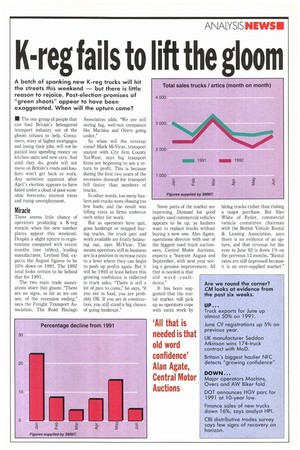K-reg fails to lift the gloom
Page 17

If you've noticed an error in this article please click here to report it so we can fix it.
• The one group of people that can haul Britain's beleagured transport industry out of the gloom refuses to help. Consumers, wary of higher mortgages and losing their jobs, will not be jostled into spending money on kitchen units and new cars. And until they do, goods will not move on Britain's roads and hauliers won't get back to work. Any optimism apparent after April's election appears to have faded under a cloud of poor economic forecasts, interest rates and rising unemployment.
There seems little chance of operators producing a K-reg miracle when the new number plates appear this weekend. Despite a slight upturn in registrations compared with recent months (see tables), leading manufacturer, Leyland Daf, expects the August figures to be 10% down on 1991. The 1992 total looks certain to be behind that for 1991.
The two main trade associations share that gloom. "There are no signs, as far as we can see, of the recession ending," says the Freight Transport Association. The Road Haulage Association adds: "We are still seeing big, well-run companie:, like Machins and Overs going under."
So when will the reversal come? Mark McVicar, transport analyst with City firm County NatWest, says big transport firms are beginning to see a return to profit. This is because during the first two years of the recession demand for transport fell faster than numbers of trucks.
In other words, too many hauliers and trucks were chasing too few loads, and the result was falling rates as firms undercut each other for work.
But as operators have quit, gone bankrupt or stopped buying trucks, the truck pare and work available are finally balancing out, says McVicar. This means operators still in business are in a position to increase rates to a level where they can begin to push up profits again. But it will be 1993 at least before this growing confidence is reflected in truck sales. "There is still a lot of pain to come," he says, "if you are in food, you are probably OK. If you are in construction, you still stand a big chance of going bankrupt." Some parts of the market are improving. Demand for good quality used commercial vehicles appears to be up, as hauliers want to replace trucks without buying a new one. Alan Agate, operations director with one of the biggest used truck auctioneers, Central Motor Auctions, expects a "buoyant August and September, with next year seeing a genuine improvement. All that is needed is that old word confidence."
It has been suggested that the rental market will pick up as operators cope with extra work by
hiring trucks rather than risking a major purchase. But Alan White of Ryder, commercial vehicle committee chairman with the British Vehicle Rental & Leasing Association, says there is no evidence of an upturn, and that revenue for the year to June 92 is down 1% on the previous 12 months, "Rental rates are still depressed because it is an over-supplied market."












































































